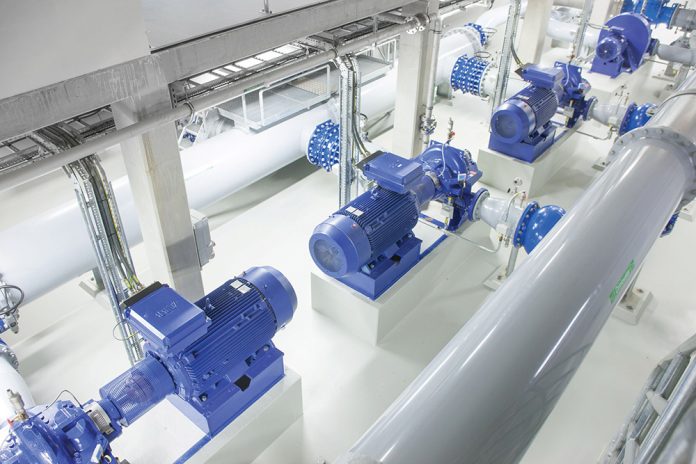In most water and wastewater applications, making a small change to the speed or control philosophy of a pump motor will generally have no negative impact on the pumping system’s effectiveness. However, when you make a large number of small changes, it can quickly add up to a more efficient and sustainable operation, as ABB’s Martin Richardson, Water Framework Manager, explains.
An estimated 70% of all industrial electrical energy is consumed by motors1, and with tens of thousands of electric motors working day in, day out across the UK water and wastewater network, this represents thousands of opportunities to save energy. Crucially, this can be achieved for the most part without negatively affecting process operation in any way.
The water industry is under considerable pressure to cut costs and deliver greater value for customers, while simultaneously working towards ambitious Net Zero targets. Significant improvements in energy efficiency and carbon performance can in fact be achieved with minimal effort, and at almost zero cost, by looking at the variable speed drives used to control the many pumps in operation throughout the network.
A variable speed drive is a device which electronically controls the speed of a pump motor. Because most pumps are centrifugal applications, adding a drive to an application that previously ran without any speed control can immediately save large amounts of energy. Centrifugal applications obey the Cube Law, which means any reduction in speed corresponds to a proportionally higher reduction in energy required. In practice, a pump running at 80% speed will use 50% of the energy that it would if it were running at 100% speed.
But what about applications that already have a drive installed? There is plenty of potential there as well. Using the same logic, for every 1% reduction in speed, the energy usage is reduced by 3%. Furthermore, making a 1% change doesn’t necessarily mean simply reducing the speed of each pump by 1%, as there are subtle changes you can make to pump control philosophies that can also quickly add up.
For instance, let’s say you’re using a pump to empty a tank overnight. In some cases, these pumps may be working harder than they have to, and the process can be slowed down while still achieving the same outcome. While pumping slower will take more time, it leads to a comparatively higher energy reduction. Therefore, if there is slack in the schedule to slow this particular process down, it can constitute a pain-free way of achieving an easy energy saving, without compromising wider processes.
I’ll provide a practical example: consider a 100,000 litre tank. If we were to pump at 1,000 litres per hour then it would take 100 hours to empty. A 100 kW pump running for 100 hours will use 10,000 kWh of energy, which equates to £2,000 in energy costs at 20 pence per kWh. If you were to instead use a drive to run the motor at 80% of the speed, this will provide a pumping rate of 800 litres per hour, and require 125 hours to empty the tank. This reduces the total energy required to 6,250 kWh, which equates to £1,250 in energy costs – a 35% saving.
When you make many small changes across the tens of thousands of motors used across the industry, this can add up to substantial energy savings. Cumulatively, improvements in operating efficiency could help the water and wastewater sector to save up to £60 million per year in energy costs.
ABB offers a free, no obligation service aimed at helping utilities to find out more about how to make water industry processes more energy efficient. The service, called the ABB Energy and Optimisation Appraisal, begins with a site visit to analyse a facility’s operations. A report is then provided identifying which applications are candidates for energy saving, and how to achieve it.
To find out more about the ABB Energy and Optimisation Appraisal, or to discuss your company’s energy usage in more depth, search for “ABB Water Challenge”.
ABB will be attending the Water Equipment Show at Telford International Centre on 16th May 2024. Talk to ABB on stand G3.



